|
|
|
Sort Order |
|
|
|
Items / Page
|
|
|
|
|
|
|
| Srl | Item |
| 1 |
ID:
131459
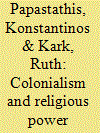

|
|
|
|
|
| Publication |
2014.
|
| Summary/Abstract |
This article critically assesses the conflict within the Orthodox Church of Jerusalem between the Greek hierarchy and the Arab laity concerning the proposals of the Mandatory Government for a new regulatory framework for patriarchal operation. The British presented two draft reform ordinances, neither of which met Arab expectations. Instead of promoting the laity's emancipation from 'foreign' Greek administrative and financial control, the ordinances left little room for a true inversion of the power structure between the two opposing camps, retaining the status quo at the expense of the Arab Orthodox rights.
|
|
|
|
|
|
|
|
|
|
|
|
|
|
|
|
| 2 |
ID:
131462
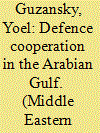

|
|
|
|
|
| Publication |
2014.
|
| Summary/Abstract |
The Arab Gulf states have systematically worked to tighten their cooperation in various fields. However, progress toward increased defence collaboration continues to be slow due to a number of factors including fears of angering neighbouring countries, particularly Iran; protecting state sovereignty; and reliance on other forms of defence, such as national militaries and foreign allies. This article traces the ups and downs of defence cooperation between the Arab Gulf nations, focusing on the establishment of the GCC and the joint Peninsula Shield Force, crucial milestones in Arab Gulf security coordination. A timeline of increased and decreased cooperation is presented, including during the two Gulf wars, along with the manner in which the joint force has been employed, its associated concerns, and the potential future for defence collaboration.
|
|
|
|
|
|
|
|
|
|
|
|
|
|
|
|
| 3 |
ID:
131456
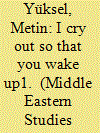

|
|
|
|
|
| Publication |
2014.
|
| Summary/Abstract |
This study focuses on the poetry of the well-known Kurdish poet Cegerxwîn (1903-84). Contextualizing Cegerxwîn's life and literary career within his specific social, political and historical circumstances, this article demonstrates the way in which Kurdish classical poetry during his madrasa education shaped Cegerxwîn's poetic creation. Furthermore, the oppression and exploitation of Kurdish peasants at the hands of tribal chiefs, sheikhs and nation-states contributed to Cegerxwîn's adoption of a Marxist and nationalist social and political standpoint. This article, attempting a closer reading of his poetry, suggests that at the essence of his poetry is found the continued use of the metaphor of awakening. Hence Cegerxwîn's poetics and politics can best be depicted as one of awakening the oppressed and subordinate social groups including the Kurds, peasants and workers from their deep sleep of oppression and exploitation. Through his Kurdish poetics and politics of awakening, it is argued, Cegerxwîn participates in the progressive political discourses of his times.
|
|
|
|
|
|
|
|
|
|
|
|
|
|
|
|
| 4 |
ID:
131457


|
|
|
|
|
| Publication |
2014.
|
| Summary/Abstract |
This research examines the role of the Lebanese Armenian diaspora (LAD) during the unstructured conflict that was the second Lebanese civil war, which extended from 1975 until 1990. This research has two aims. The normative aim is to find patterns of diasporic activity in conflict such as to support positive activities and discourage negative activities. A second is to focus on an empirical case study of the LAD in order to demonstrate that the diaspora encouraged peace-making initiatives and discouraged peace-wrecking. Importantly, the LAD as a political actor in Lebanese society played a positive role in promoting dialogue, cooperation, conflict resolution and reconciliation and had a significant impact on politics in general and conflict behaviour in particular. This study concludes that it is worth studying diaspora behaviour in conflict because a diaspora could be a powerful actor in conflict resolution and peace-making.
|
|
|
|
|
|
|
|
|
|
|
|
|
|
|
|
| 5 |
ID:
131460
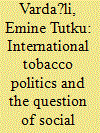

|
|
|
|
|
| Publication |
2014.
|
| Summary/Abstract |
A proliferation of scholarly works offering a variety of modernization experiences facilitated an understanding of social protests in non-western settings. Focusing on the initial stages of modern social movements in Iran and the Ottoman Empire, this study makes a comparative analysis of the tobacco protests at the turn of the twentieth century. The social protests against foreign tobacco monopolies are regarded as a key moment for the emergence of modern social movements in these countries. Scrutinizing the negotiation strategies, social value systems and political structures of these countries, it is suggested that these tobacco protests played a catalytic role in the process of capitalist incorporation and adaptation to the accompanying value systems of modernism and liberal democracy.
|
|
|
|
|
|
|
|
|
|
|
|
|
|
|
|
| 6 |
ID:
131458
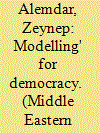

|
|
|
|
|
| Publication |
2014.
|
| Summary/Abstract |
Although Turkey has come a long way in terms of human rights since the 1980 military coup, a closer historical look inside the Turkish political scene shows us how freedom of speech was always to be sacrificed if its exercise threatened the perceived unity of the country. The article shows how decision makers' perceptions of the state as a superior institution in need of protection have shaped the practice of governing free speech in Turkey since the early years of the Republic, and introduces a unique chronology, accounting for the interaction of internal and external influences.
|
|
|
|
|
|
|
|
|
|
|
|
|
|
|
|
| 7 |
ID:
131463
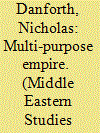

|
|
|
|
|
| Publication |
2014.
|
| Summary/Abstract |
This article examines popular, academic and political perceptions of the Ottoman Empire in Republican Turkey, challenging the widespread assumption that there has been a continuous clash between pro-Ottoman Islamists and secular, anti-Ottoman, Kemalists. It argues that in the Republican period Kemalists effectively appropriated the Ottoman past for use in their nationalist narrative, not only through using a 'theory of fatal decline' but also by simply defining positive cultural or political symbols from the years 1299 to 1923 as 'Turkish' rather than 'Ottoman'. This serves as a backdrop for the article's main argument, that the 1940s and 1950s saw a thorough Kemalist appropriation of the Ottoman past, celebrating the empire's golden age as secular, pro-western and Turkish. The 500th anniversary of the conquest of Istanbul in 1953 gave the Turkish government an opportunity to showcase this new interpretation of Ottoman history as well as to use the relatively new rhetoric of 'Ottoman tolerance' to claim for Turkey a place among its new allies in the democratic, anti-communist West. At the level of domestic politics, the Democratic Party sought to wrap its modernization policies in the mantle of a progressive, democratic Fatih Sultan Mehmet II, while the Republican People's Party condemned the Democrats for betraying Fatih's memory and the nation's honour by downplaying the Ottoman past in order to placate potential anti-communist allies in Greece and the Arab world. Ultimately, the article argues that it is impossible to understand contemporary Islamist and liberal uses of the Ottoman past without understanding the way the empire was incorporated into the dominant Turkish nationalist narrative between 1923 and 1953
|
|
|
|
|
|
|
|
|
|
|
|
|
|
|
|
| 8 |
ID:
131455
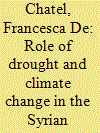

|
|
|
|
|
| Publication |
2014.
|
| Summary/Abstract |
This article examines the role of drought and climate change as triggers of the Syrian uprising that started in March 2011. It frames the 2006-10 drought that struck north-eastern Syria in the context of rapid economic liberalization and long-standing resource mismanagement, and shows that the humanitarian crisis of the late 2000s largely predated the drought period. It argues that focusing on external factors like drought and climate change in the context of the Syrian uprising is counterproductive as it diverts attention from more fundamental political and economic motives behind the protests and shifts responsibility away from the Syrian government.
|
|
|
|
|
|
|
|
|
|
|
|
|
|
|
|
| 9 |
ID:
131461
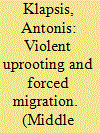

|
|
|
|
|
| Publication |
2014.
|
| Summary/Abstract |
This article systematically examines the historical demography of Greek refugees from Asia Minor, Pontus and Eastern Thrace from the beginning of the 1910s until the aftermath of the signing of the Convention of Lausanne and even later until 1928 when the first general census after the Asia Minor Disaster of 1922 took place in Greece. In this context, the article focuses firstly on a comparative examination of the available sources concerning the number of Greeks living in Asia Minor, Pontus and Eastern Thrace before the outbreak of the First World War, and secondly on the number of refugees pouring into Greece before and after the Asia Minor Disaster of 1922. It is argued that the Greeks of Asia Minor and Pontus suffered numerous losses because of the persecution by the Turkish authorities and because of their violent uprooting from their homelands. On the other hand, it is argued that the Greek population of Eastern Thrace was in general much less affected by the Turkish atrocities despite the fact that even this population was obliged to seek refuge in Greece after 1922.
|
|
|
|
|
|
|
|
|
|
|
|
|
|
|
|
|
|
|
|
|